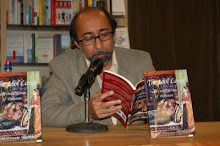I must confess I'm a fan of Korean fiction. It began with a chance encounter with Yi Munyol's Our Twisted Hero many years ago. A blurb by Rushdie, too, might have played a role. Last year it was The Old Woman With a Knife by Pyŏng-mo Ku, probably a recommendation by a fellow writer. Although I can't recall the person but it was again a writer friend gloating over the title that I picked up another well-written novel Violets by Kyong-sook Shin.
It's a story of what may happen to one as a grown up when one has encountered abandonment by one's parents. To make matters worse, a sort of rejection by a close friend can add fuel to the fire, innocent/nascent sexual attraction notwithstanding. Each person will react to such an accumulation of deeply embedded sorrows differently because of each personality is different. Still, the wounds of abandonment, especially by the parents, have the power to make one feel unworthy of love and care. In a delicate show of such behavior, San, as a young woman now, refuses whenever she's offered good food because of its association with the special dishes San's mother would make before her periodic and then final disappearances.
As San leaves her childhood and village behind, she finds some solace at a flower shop owned by a kind man, who is mute but can hear and scribble his conversation. She also forms friendship with her coworker who is able to lift her spirits due to her natural sprightly demeanor and similar history of abandonment. San tries to have a good time here and there and makes an attempt to come out of her deeply ingrained moroseness. Even though her anger and a sense of unforgiveness towards her mother persist, despite the older woman's pleas to reconnect as she suffers from deteriorating health, San takes the ultimate plunge to allow men into her life. There are setbacks, non-acknowledgment, refusal, a scary encounter with a motorbike cop, a figure one is supposed to trust, and though she appears to survive those, one wrong move on her part crushes her soul and body. After the man who she thinks is attracted to her does not remember her, she calls another acquaintance who she doesn't care for much - but it's too late. The man, feeling insulted by her change of mind, manages to overpower her. He is able to drag her to a room because of the inequality in their physical strength where he violently rapes her. The final pages of the novel assure the reader that San is not dead but has only disappeared, left the flower shop, faded from the story. That assurance is needed because San, post-rape, reaches a construction site where she willfully bruises her body by banging into a huge machine.
Despite being a very well written novel, it errs in suggesting a logical connection between unloved, abandoned childhood and becoming a prey to male violence. That somehow the scars of San's childhood stunted her ability to sense danger, and in doing so, the novel shirks from looking at the issue (and nature) of sexual violence. It is common sense to assume that even if San had grown up with loving parents, with all the gadgets of comfort provided, she still could have found herself in the wrong place, at the wrong time. In other words, she could still be one more victim of sexual violence or rape.
And, on a slightly different note, although the narrator assures her reader that San, like many others like her, live and survive, Kyong-sook Shin's literary choice to push San off the page further consolidates her error. Perhaps I use the word error reluctantly. It is a complex novel and in complex novels, authors of higher stature take risks. Their choices are their risks and sometimes a risky choice will, for one particular reader such as me, have a reflection of an error. Those reflections, sometimes, make a novel even more layered. This is one such novel!


